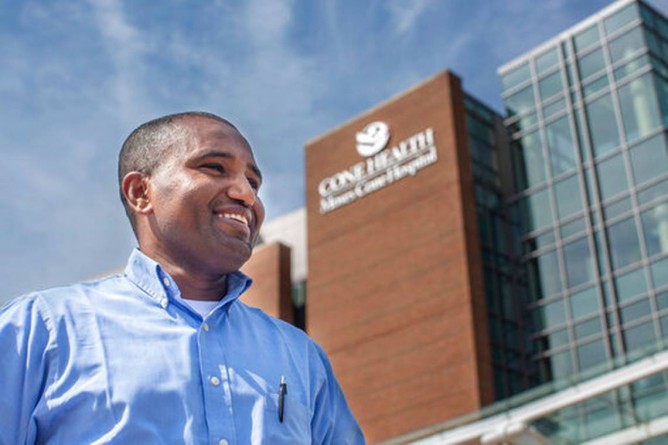 With a stipend of $50 a month as a volunteer at an infirmary in a refugee camp Taye Gonfa spent a decade chasing his dream to become a doctor. (Photo credit: Khadejeh Nikouyeh -AP)
With a stipend of $50 a month as a volunteer at an infirmary in a refugee camp Taye Gonfa spent a decade chasing his dream to become a doctor. (Photo credit: Khadejeh Nikouyeh -AP)
The Herald
By Nancy McLaughlin (Greensboro News & Record)
As a young boy, Taye Gonfa wanted to fly the planes that he often spotted above the family’s hut in Ethiopia.His aspirations were only as far as he could see, which was a world otherwise steeped in poverty. But there was his mom — unschooled and very pregnant with him when her husband drowned in a flooded river trying to get home from work — wanting so much more for him. She would be the first of many whose guidance would eventually lead him down the sterile hallways of Moses Cone Hospital — with “Dr. Taye Gonfa” on his badge.
He’s been very fortunate to have some doors open up for him,” said Dr. Bill Hensel, who was on the selection committee that offered Gonfa a residency at the hospital. “But don’t underestimate the fact that he has made his own luck and run through those doors.”
Gonfa, who arrived in the United States a decade ago and turns 38 this year, hopes he is leaving footprints for his two children and other refugees, especially, to follow. “I got to this point,” he said, “because I did not stop chasing my dream.”
The first time Gonfa would be on one of those planes he had seen as a boy was the flight to New York and then Greensboro as part of the United Nations refugee resettlement program.
The journey getting there began in high school, when he saw classmates signing up for one of the 60 competitive spots for medical school. As in some other foreign countries, medical school is a seven-year track starting in high school.
“I figured, ‘Why not?’” said the quick-witted and affable Gonfa, who speaks English with African and British influences. In 2000, during his second year in the program, he joined hundreds of other students in a massive protest against the government that erupted in the capital city of Addis Ababa, and spread throughout the country.
“The next day,” he said, “I went to my college library and tore the Ethiopian and Kenyan maps out of the world atlas.”Gonfa and some of the other students used them to flee to nearby Kenya where the rebels had settled.
Soon after crossing the border, he was arrested, turned over to a United Nations official and taken to a refugee camp in northeastern Kenya. In the camp, where Gonfa would be confined for the next eight years, he had shelter — and a ration of grain. “There was never enough food,” he said.
One day while taking a friend to the camp’s infirmary, he mentioned to the physician on duty from Doctors Without Borders about having started his second year in medical school before joining the rebellion. As the two continued to talk, the doctor suggested he apply as a volunteer in the infirmary, which came with a stipend of $50 a month.
“That was huge,” Gonfa recalled.
Gonfa was a marvel in the infirmary where most of the medical support staff had elementary or middle school education at best. Soon, he was delivering babies.
“You watch what the doctors do and then you do it,” Gonfa explained. He was just 19.
You can read more about Taye Gonfa’s journey in The Herald article here.
—
Join the conversation on Twitter and Facebook.

























